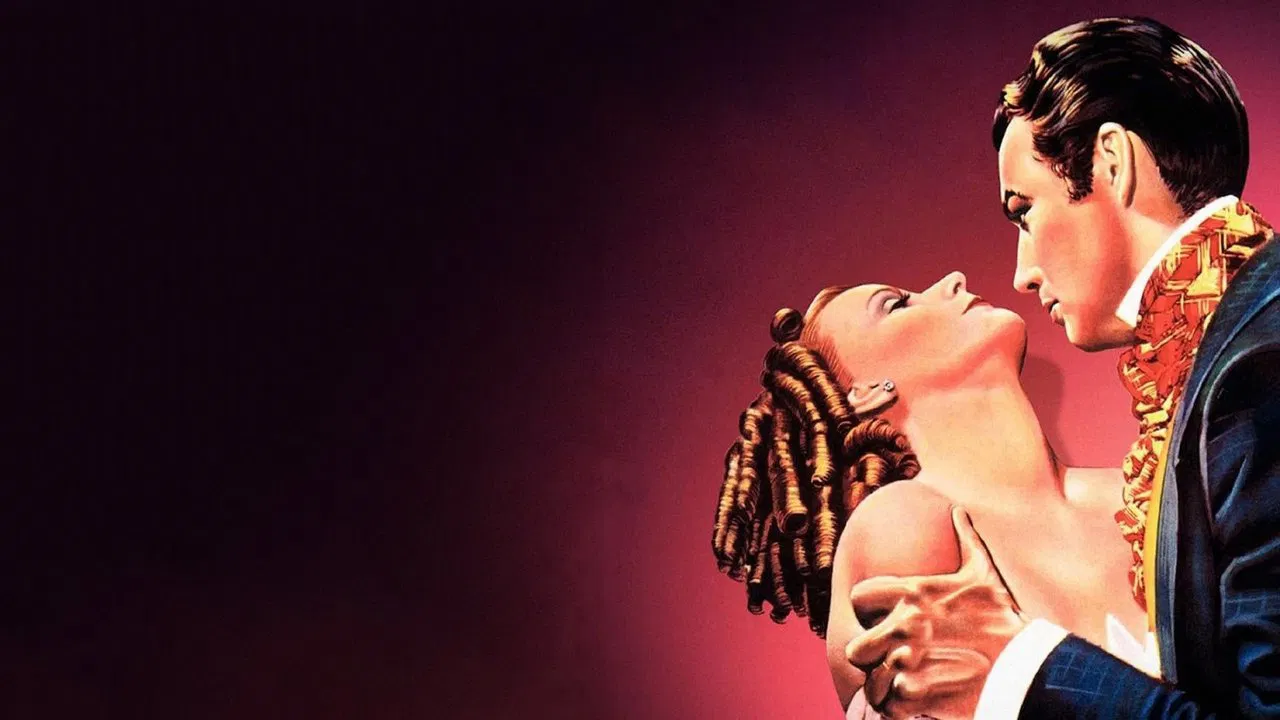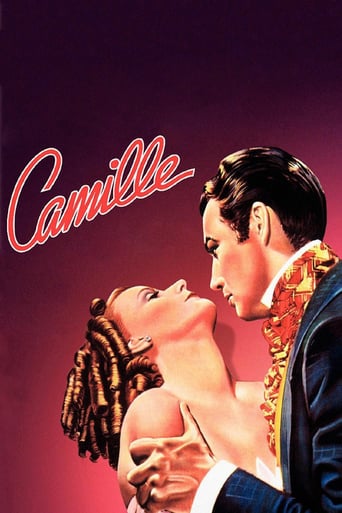

Quite dull.Based on the Alexandre Dumas fils novel and play, and set in France in the mid-1800s, a story of romance and social machinations. And that's all it is really. Just one long examination of mid-1800s upper class types and social intrigues and manipulation. Complete with the inevitable duel.It all feels so stuffy, irrational and overwrought, especially by today's standards. Who knew relationships were so complicated in the 1800s...?Really only for people who like 1800s romances and period pieces.
... View MoreNo wonder Robert Taylor decided to grow a mustache. In "Camille", he is definitely eye candy, even lovelier than his leading lady, the very handsome Greta Garbo. Yes, Garbo is certainly beautiful, but when you put the two side by side, two things are apparent: A definite age difference and reasons why their sexual preferences have been questioned.Garbo and Taylor were only six years apart, but it is that six years of life between them (he was 25, she 31) where maturity takes over the face and one truly transforms into adulthood. Taylor is so youthful here he looks like a college boy, more appropriate for being behind the barricades of "Les Miserables" than hanging around the idle wannabe's of society. Yes, both "Les Miserables" and "Camille" are set in 1800's Paris, albeit 20 years between each other, and both give a completely varying view of life as it was.Garbo is Marguerite, a fun-loving courtesan in search of a new benefactor who finds one in a wealthy Baron (Henry Daniell). While he gives her money and a fancy apartment to host parties for her rather tacky friends (which includes an aging courtesan played by Laura Hope Crews) who isn't hangin' around just because she adores Marguerite's company. When Marguerite meets the handsome Armand Duval (Taylor), she is awestruck by his beautiful face and they begin an affair while her benefactor is away. The Baron and Armand's father (a hammy Lionel Barrymore) makes demands so Garbo dumps him, but destiny is not meant for them to be apart, even if it is for a sad farewell.This opulent, almost operatic tearjerker, is the quintessential Garbo film, and she is impeccably gowned and coiffed. The film screams with the Thalberg stamp (his productions were always the most lavish at MGM) and everything is exquisitely detailed from the overstuffed sets to the number of extras in the party scenes, a wedding sequence, and a gambling room which leads to a dramatic confrontation between the two rivals for Garbo's affections. Who better to direct such a masterpiece than George Cukor, the man behind "Dinner at Eight" and much later "A Star is Born" (the Garland version) and "My Fair Lady"? Together, the producer (always uncredited with the exception of the memoriam credit of his name in "The Good Earth") and director stage a saga that requires repeat viewings to take everything in.My only real fault with this movie is that there really is no chemistry between Taylor and Garbo. For playing a character suffering from tuberculosis, Garbo avoids being melodramatic, and even offers some sly humor into her obvious "woman of ill repute" character. Taylor is rather animated in his gestures. Fortunately, this was almost a decade after sound came in; Leading men in early sound films tended to have to wear too much lipstick which now makes many of them look truly ridiculous. He is spared that indignity in spite of still being a bit too pretty and youthful for his still lovely leading lady who, in spite of being obviously feminine, sometimes comes off a bit mannish. This doesn't reflect in her performance as she is at all times vulnerable, somewhat down to earth, and even sympathetic to Danielle's imperious baron.Don't expect a George Sanders/Basil Rathbone villain role for Danielle. You really understand why he reacts the way he does, although his high crust European persona never softens him. He is a character who knows that he is being used, but when he feels he is being made to look like a fool, finally stands up and cracks back. Crews truly surprises with her foolish older woman character who admits that the champagne she drinks at a wedding youthens her but makes her feel like an old woman when it goes to her feet. A final twist with her shows the selfishness hidden underneath her initial flibbertigibbet mentality. You'll completely fall in love with Jessie Ralph, the salty character actress who plays Garbo's devoted companion. She could go from imperious ("After the Thin Man") to revealing ("San Francisco") to motherly ("The Blue Bird") with each appearance, and in this film, her heart never leaves her mistress. Eily Malyon also stands out in a small role as the maid in the country home Garbo stays at. Practically forgotten today, she appears in practically every major literary adaption, most notably "David Copperfield" and "A Tale of Two Cities".While tuberculosis is never mentioned by name, it has been assumed that is the illness that Garbo is suffering from throughout the film. It is also never mentioned by name (as per the Hays code) what Garbo does to make a living, but cleaned up dialog truly expresses what her gentlemen friends are getting out of an obvious bargain, especially when Barrymore confronts her about his plans for his son's future.
... View MoreI must confess to approaching Camille with some trepidation. The story had been done so many times in opera, theatre and cinema that my question was simple.What would MGM bring to the party that others hadn't, especially in those years between the Depression, the growth of fascism in Europe and the outbreak of World War II? The answer is, of course, a wonderful cast, great direction and sumptuous sets and costumes. My fears that this would be given an overly-sentimental Hollywood treacle treatment were wholly unfounded. It was interesting to see how the film gets the message across that Marguerite is a courtesan ("hooker" just sounds too down and dirty for Garbo!). No overt mention of her trade is made in the dialogue although in the titles we are informed that these women are "girls of discretion". But the way Garbo moves, reacts to events and speaks leaves us in no little doubt as to her profession.Robert Taylor plays a touching Armand, Henry Daniell is outstanding as the Baron and Lionel Barrymore skilfully manages a blend of severity and compassion in the comparatively short, but crucial, scene in which he appears with Garbo.Any downsides? Well,maybe a scene or two could have been shorter, or even excluded but this is a minor issue. Not quite a masterpiece but essential viewing for anyone interested in the history of film.
... View MoreSumptuous Golden Age weepie starring the divine Garbo cast slightly improbably as a, shall we say, mature, but consumptive courtesan caught in a love triangle with cold-hearted moneybags Lord De Varville and poor impressionable young thing Armand.In the end the consumption wins but the build up to the tragedy is high-quality costume melodrama with Garbo in captivating form as the epicentre of scandal in high society France - there are lots of mesdames and monsieurs but scarcely a Gallic accent in sight. Director Cukor doesn't overdo the focus on Garbo, preferring to film her in double portraits, most usually with Robert Taylor as the ardent Armand but it's her you'll be drawn to. Hardly sylph-like and certainly not a conventional beauty she acts beautifully and for the most part convinces you of her power to captivate men at a hundred paces. She gives her not altogether pleasant character depth and profundity by injecting emotion and humanity into her performance, even coaxing out what looks like a real teardrop after one of her emotional farewells with her young lover.The supporting characters are well written and played from Camille's so-called society friends who by the end are raiding her handbag for money as she lies expiring on her death-bed, while Lionel Barrymore impresses in a sensitive scene as Armand's father persuading her to give up her love for his son. Taylor plays the callow youth with vigour while Henry Daniell is suitably reptilian as the controlling sugar daddy.The sets and costumery are excellent and director Cukor confidently moves his actors around the scenery, contrasting the vain-glorious narcissism and decadence of the idle rich with the simple-hearted devotion of Camille's housekeeper and close friends.Of course the language is all very flowery and sometimes wearing on the ears, but it doesn't take long to become engaged with the film and, yes, care about the characters. New rivals were emerging in Hollywood to compete with Garbo as the top female star on the block, like Hepburn, Davis and of course, from nearer her own era, Deitrich, but here, on top of her game, Garbo still sends out a catch-me-if-you-can dare to these and others.
... View More